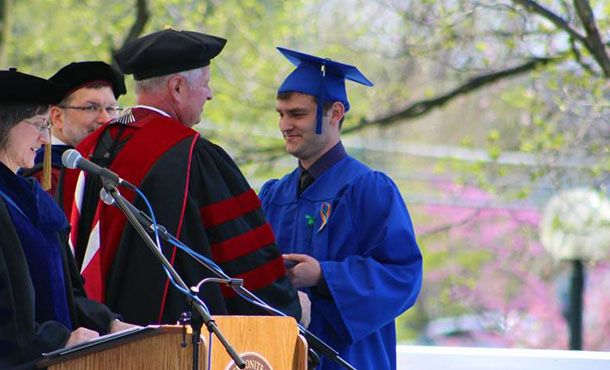Teams comprised of Eastern Mennonite University computer science and math students beat 47 teams across the nation in a contest that required code-breaking under time pressure.
The EMU teams took first and third place at this year’s Kryptos competition sponsored by Central Washington University. The first-place team was made up of freshman Aron Harder and seniors Stephen Quenzer and Josiah Driver. The third-place team included senior Mark Harder (Aron’s older brother) and Eastern Mennonite High School freshman Cameron Byer, the son of EMU mathematics professor Owen Byer.
Kryptos is a code-breaking competition of secret writing, known as cryptanalysis. The 2014 competition included three encoded messages that teams worked on over a long weekend. Once an encoded message was cracked and the plaintext English was revealed, contestants quickly wrote a one-page description on their methods before moving to the next code. The teams were judged not only on breaking the codes, but on how quickly they did the work.
While all three of the men on the winning team are computer science majors, none of them had any cryptanalysis experience prior to the competition. In fact, both EMU teams only entered the competition the day before it was scheduled to start and for the most part prepared by briefly Googling cryptanalysis strategies and the previous years’ problems, said Driver.
Quenzer, Driver and Aron Harder are all in Owen Byer’s statistics class. Their final statistics project involved collecting data and developing a presentation based on their findings. Unfortunately, as is the case sometimes with statistics, their data ended up being inadequate for clear findings, Quenzer said. They went to professor Byer for help and he offered them this alternative: If they would participate in the Kryptos competition, he would accept this in lieu of their final statistics presentation.
Mark Harder, who is a math and computer science major, happened to be writing a paper on the history of cryptanalysis for one of his classes when he heard about the competition. He had developed a friendship with Cameron (the high school student), and the two decided to enter the competition just for fun.
“It doesn’t help to have a lot of previous knowledge,” Harder said, because “each problem is quite a bit different.” What is important is “being able to be flexible and think outside the box.”
Quenzer viewed his team’s crash-preparation for the contest and resulting win as no big deal, noting that typically “all three of us put a lot more effort into our studies than is necessary – we go above and beyond.”
The EMU first-place team was the only team to solve all three problems. The EMU third-place team solved two problems, but was just beaten time-wise by the second-place team.
Similar to EMU, Central Washington University had two teams in the top three winning categories. Other teams that placed represented: Pacific University, Sarah Lawrence College, Western Washington University, Eastern Oregon University, University of Arizona, and University of Central Missouri.
